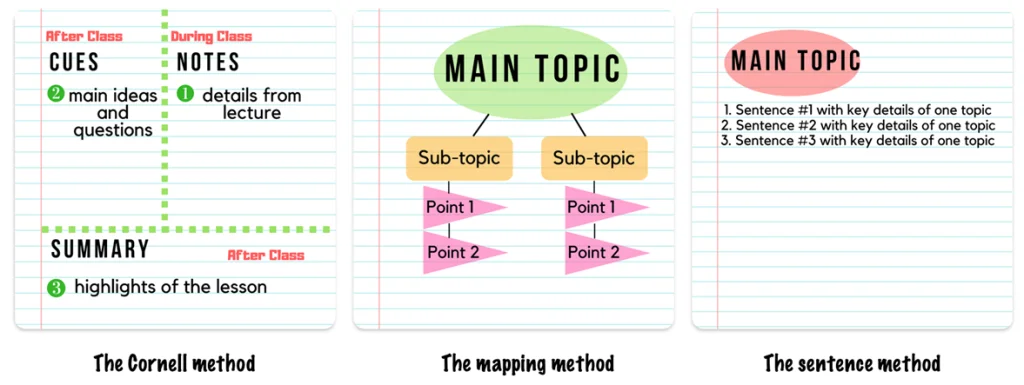The secret to morphing into a successful student is mastering the art of intelligent, not strenuous studying. As you proceed with your educational journey, this becomes increasingly critical.
A day’s study of one or two hours is typically enough to navigate through high school with commendable grades. However, the onset of college can seem overwhelming without shrewd study practices, making it feel like the hours of the day aren’t sufficient to manage your coursework.
While a handful of students sail through academic life with minimal exertion, a significant majority achieve success because they intentionally foster and apply efficient study habits.
Presented below are the top 10 study habits employed by highly effective students:
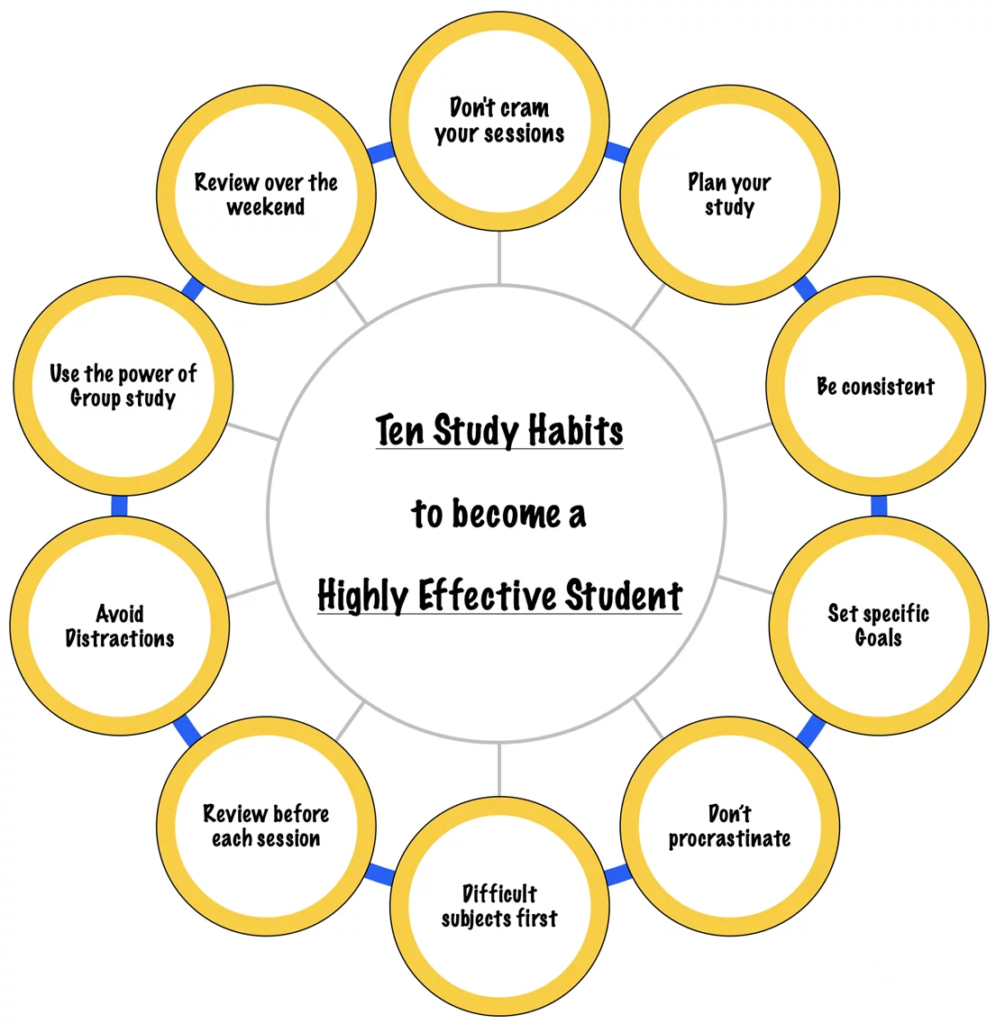
Should you aspire to become a prosperous student, don’t let discouragement or the idea of surrender seep in. Strive to nurture each of these habits, and you’ll witness a surge in your grades, an augmentation of your knowledge, and an enhancement of your ability to comprehend and absorb information.
-
Avoid packing all your studying into one session
Ever found yourself up late at night, devoting more energy to staying awake than actually studying? If that’s the case, it’s time to rethink your approach.
Studies suggest that distributing study sessions over lengthy periods improves long-term memory retention. Put differently, if you have a 4-hour study window for a subject, it’s more beneficial to break it up into one hour each across four days than to cram all 4 hours in one go.
Similarly, cramming everything right before an exam may aid temporarily in fetching grades, but it’s catastrophic for your long-term memory retention. Unknowingly, you might be sabotaging your long-term learning.
Proficient students usually distribute their work over shorter durations and seldom try to squash all their studying into one or two sessions. If you aim to be a successful student, you have to learn to sustain uniformity in your studies and maintain frequent, yet shorter, study intervals.
-
Plan your study sessions
Accomplished students line up specific study times throughout the week and adhere to them, whereas those who don’t fare as well generally study in a haphazard and whimsical manner.
A study schedule can assist you in planning, dividing your study load into manageable chunks, and ensuring you don’t scramble to complete assignments while adhering to deadlines.
In brief, a study plan helps you manage and achieve your learning objectives more effectively.
Even if you’re up to date with your studies, establishing a weekly routine wherein you designate some time every few days in a week to review your courses will ensure you develop habits that prime you for success in your long-term education.
-
Be consistent; study at the same time
Not only is it crucial to map out when you’re going to study, but it’s equally important to establish a consistent, daily study routine.
The efficacy of consistency is well recognized in academia. It reduces dependency on intensity – leading to fewer late nights or all-nighters and reduced instances of being overwhelmed and panicky, which is beneficial for your mental health.
When you study at the same time every day, you cultivate a habit. Your dependence on willpower decreases. You experience a rise in motivation, and you’ll be mentally and emotionally ready for each session, leading to increased productivity.
Unanticipated events may occasionally demand adjustments to your schedule, and that’s acceptable. But it’s vital to revert to your routine as soon as the event concludes.
Here are some tactics to maintain your routine:
Create a timetable – Regardless of your history with sticking to timetables, frame one. Ensure it’s realistic and post it up at your study spot. Timetables aid in enhanced time management, which studies have revealed has a direct positive correlation with academic outcomes.
Exercise and meditate – In order to maintain consistency in your studies, your health and mind must be your allies. Physical workouts help you retain good health and a clear mind, whereas meditation aids in mitigating stress and anxiety.
Reward yourself – If you adhere to your timetable, pat yourself on the back. Head outdoors and relish some downtime with your friends and family. While doing so, switch off from your studies. Rewarding yourself fuels motivation to be consistent.
Take breaks – Contrary to the common thought, taking breaks, provided they’re of the correct type, can enhance productivity rather than drain it. Steer clear from activities such as endlessly scrolling through social media or cruising the internet. Instead, go for a light stroll, consume a nutritious snack, or engage in conversation with your roommates.
-
Set specific goals for each study session
Studying aimlessly without a clear objective isn’t efficacious. You need to be fully aware of what you aim to achieve during each study session.
If you notice, most adults around you – from those employed in leading corporations to your admired athletes and entrepreneurs have detailed goals and objectives. These goals guide their daily activities and time management approaches.
Numerous research studies have indicated a positive relationship between goals and student outcomes. Hence, before diving into your studies, establish a study session goal that aligns with your overarching academic aims. Here are some ideal practices:
Establish optimally challenging goals – Your objectives should be set in such a manner that you’re driven to accomplish them, but they shouldn’t be so grueling that they discourage you.
Configure your goals to be specific, measurable, and time-bound – A suitable example is “Memorize 30 Spanish vocabulary words in the span of 60 minutes to excel in the Spanish test.” It’s a sound goal because it provides clear directions on what needs to be done, offers a measurable benchmark, and requires completion within a defined time frame.
Contrarily, “Study Spanish to ace the Spanish test” – isn’t a proper goal because it lacks focus, the outcomes can’t be effectively gauged, and there’s an absence of a completion deadline.
Establish mastery goals – Your goals should concentrate on thoroughly comprehending concepts and skills. This will assist you in your extended learning journey that goes well beyond just exams and grades.
Articulate goals positively – The way you phrase your goal can make a significant difference. If your goal sounds more threatening than challenging, it might negatively influence your accomplishments.
For instance, “I will successfully complete at least 7 out of 10 tasks” is a superior goal compared to “I will not commit more than 3 mistakes when attempting 10 tasks.”
For a better understanding of why goals work, examine the following diagram:
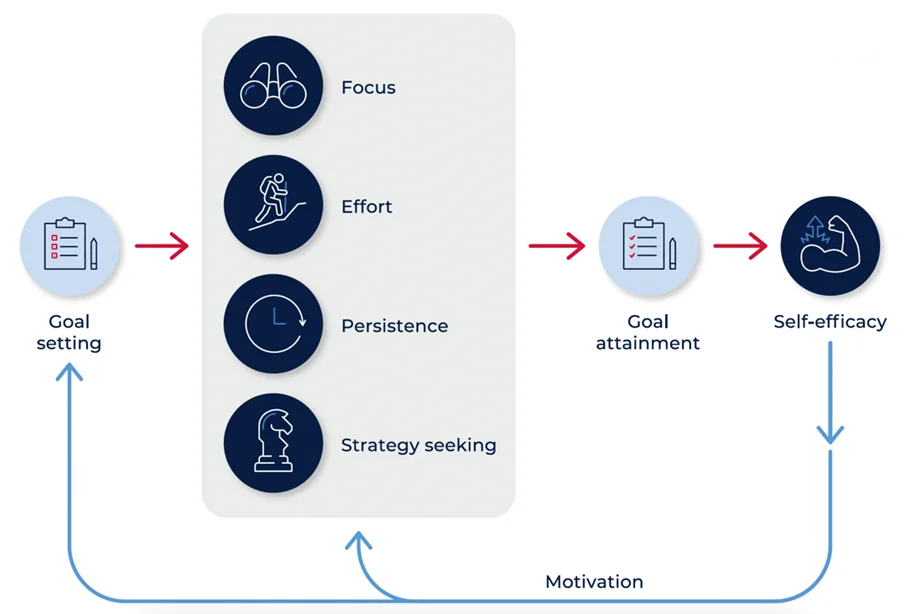
Formulating goals provides clarity on what needs to be accomplished. It helps you to focus your attention and energy on the right tasks, steering clear of distractions. This clarity prompts you to exert more effort and unearth or devise new strategies for success.
You utilize your existing knowledge in innovatively and learn fresh approaches. Achieving your goal bolsters your trust in your skills, amplifies your motivation, and paves the way for greater success down the line.
-
Avoid procrastinating your scheduled study session
It’s often tempting and common to delay your study session due to numerous reasons – the subject may not be appealing, you might have other tasks to manage, or it might be due to the complexity of the assignment.
Successful students DO NOT procrastinate while studying.
Breaking the habit can be challenging, especially when the internet makes it easy to dodge frustrations with just a simple click.
Procrastination can bring about negative outcomes – your study efforts may become significantly less efficient, and you might not complete everything that’s necessary, which could result in last-minute cramming – a prime cause of errors.
Furthermore, it can also have repercussions on your mental health, augmenting stress and anxiety levels:
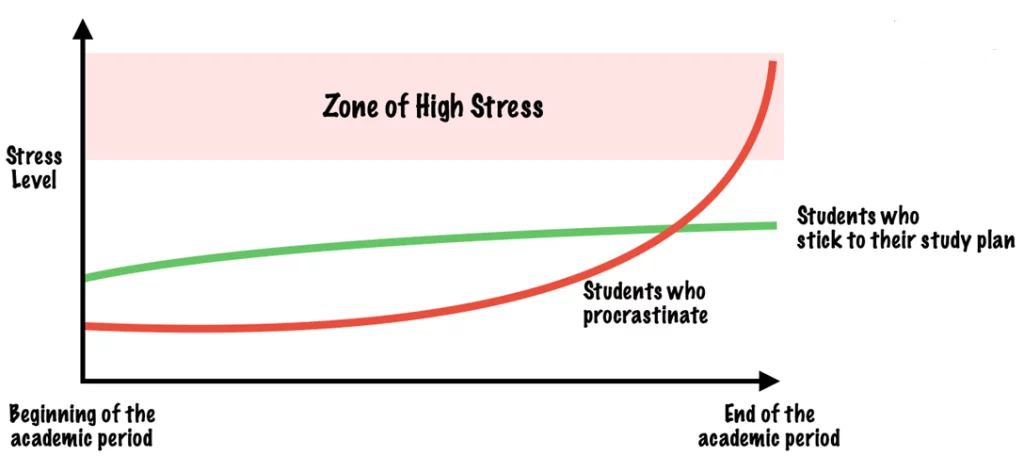
Procrastination can escalate stress levels and negatively impact a student’s mental health and overall well-being.
Procrastination arises when the emotional aspect of your brain overpowers the logical facet. Your rational brain capitulates when you choose social media browsing over work or opt to binge-watch another series on Netflix.
Here are some steps you can implement to regain control by your logical brain:
Pinpoint triggers: One of these seven triggers could be the reason you delay a task:
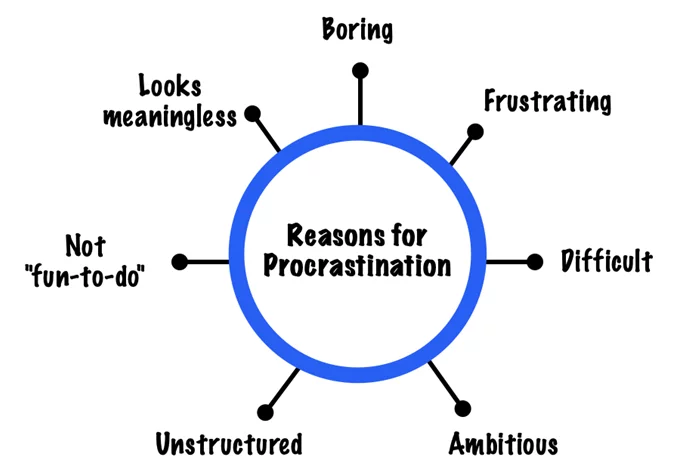
Pychyl’s seven procrastination triggers (Source: Harvard Business Review)
Subdue the trigger: Think about which of the seven triggers is set off by your study activity. Subsequently, try to reform your perception about the task – make the concept of finishing it more appealing.
For instance, if studying history through mere reading seems monotonous, you can make it more engaging by sketching a timeline featuring significant events and characters.
Work within your resistance capacity: Let’s assume you have a complex math problem to tackle. Determine your resistance level by considering the effort you’re willing to invest in that task along a scale.
For instance, could you concentrate on it for an hour? No? What about 30 minutes? Gradually reduce the time span until you find a time frame that no longer generates resistance towards the task, and then go ahead with it.
Initiate something, anything, to get the ball rolling: tasks that provoke procrastination are seldom as awful as we perceive. It’s easier to maintain momentum once you’ve crossed the initial hurdle of kickstarting it. Beginning a task ensures that you’ll continue to ponder on it, making you more likely to revisit the task later.
Document the consequences of procrastination: remind yourself of the drawbacks associated with delaying a task.
Disconnect – Place your mobile device in an alternate room or turn off the Wi-Fi. Minimize the distractions that can prevent you from staying focused on the task.
-
Embark on the toughest subject first
Your most challenging assignment or subject will demand the most effort and cognitive energy; therefore, you should initiate with it first.
Studies have indicated that when you’re fatigued, your brain strives to conserve mental energy to assist you in making decisions rapidly. It labels effort as unfavorable (since it’s arduous work), and you’re more inclined to “trust your instinct” rather than meticulously analyzing all the accessible information.
When your concentration is somewhat waning, tackling tough subjects can indeed be, well, tough!
However, if you handle the most demanding aspects of your study when your mind is fresh, it becomes simpler to manage the more straightforward parts later. This approach can notably enhance the efficacy of your study sessions and subsequently boost your academic performance.
-
Always scrutinize your notes prior to initiating an assignment
Studies indicate that allocating 10 minutes to reviewing every hour spent on lectures, all within a span of 24 hours post-class, significantly enhances recall. Thus, routinely revisiting class notes constitutes one of the most effective study strategies.
Of course, before you can examine your notes, you need to have notes ready for inspection. While there’s no one-size-fits-all method to note-taking, the following are some of the widely embraced ones:
Cornell Method
Divide your paper into three sections (see image). The initial part entails jotting down notes as you hear them during the class. Once the class is concluded, reread your “Notes” section and incorporate any questions or crucial ideas within the “Cues” section.
Once these two sections have been filled in, it’s time to compose a summary of the lesson that can be referred to during studies. By the time exams come around, you’d have an organized stack of notes from each lecture. You can learn more about The Cornell System for taking notes.
Mapping Method
This method allows for a visual representation of your notes in a way that highlights the connections between ideas. Start by jotting down the main idea of the lecture and add subheadings as you go through the class. By the end, you should have a central topic with multiple subheadings, with additional notes placed under them.
Sentence Method
This is a relatively uncomplicated method that requires a main topic succeeded by notes in sentence or point form. The heading provides some form of organization while also allowing for freedom.
While these three are time-tested approaches that involve pen and paper, using electronic devices for note-taking is also an option. Applications like Evernote, Microsoft OneNote, or Google Keep can assist you in keeping your note-taking well-organized.
Before you begin each study session or a specific assignment, thoroughly review your notes to ensure you know how to rightfully execute the assignment. This will aid in reinforcing vital subject matter learned during the day and make certain your studying is focused and effective.
-
Ensure that you’re not distracted during your study time
The detrimental effects of learning amidst distractions have been well-established. Distractions can lengthen learning tasks due to the necessity to revisit and re-familiarize with the material, induce mental exhaustion from constant task-alternation, and diminish long-term memory retention.
However, everyone does get distracted by one thing or another. It could be the TV, family, or the numerous electronic gadgets around you. When you’re distracted, you lose focus and your train of thought, which leads to ineffective studying.
Interestingly, some students find it hard to study in absolute silence. Studies have shown that certain people study better with a touch of background noise.
It’s essential for you to experiment and figure out what kind of environment suits you the best. Be it a quiet cubicle tucked away in the corners of the library or a communal area with a bit of ambient noise, find a place where you won’t be disturbed or distracted.
-
Utilize Study Groups Effectively
Study groups can assist you in vocalizing your thoughts, overcoming procrastination, energizing study sessions, and maintaining accountability. They can be an effective component of your comprehensive study strategy.
Working in groups allows you to seek help from others when you’re struggling, expedite the completion of assignments, and provide teaching to others which can be a potent method to deepen your understanding of the subject.
Here are some recommended practices for forming efficient study groups:
Limit the Group Size – Bigger groups make it increasingly challenging to involve everyone. Ideally, a group of 3 to 5 students can ensure a beneficial dynamic.
Have a Structure – Define the objectives of every session and adhere to them.
Come Prepared – Each member coming to the session with a list of questions or topics to discuss makes it significantly easier for the group to aid each other.
Empower Each Other – Don’t hesitate to assist your fellow students. Tutoring relationships are mutually beneficial. Help someone else, and they’ll help you.
Quiz Each Other – Testing each other’s understanding of facts and concepts is an incredibly useful way to prepare for an exam. This could also include creating practice tests together.
Work Independently but Together – If you’ve put in solid work on your own before meeting as a group, your group time will be more fulfilling. Groups serve as your experimental space, a place to seek assistance and share learning. However, it’s crucial to develop an independent understanding of the theories to fare well in a course.
Foster Friendships – Building connections can inspire an unprecedented level of motivation and make studying enjoyable.
It’s also beneficial to appoint one of the members to steer the group. This person will be accountable for organizing schedules, monitoring group progress, and ensuring the group remains focused. A practical method to do this could be by assigning a “leader of the week” on a rotating basis.
Study groups aren’t only intended for last-minute gatherings right before an exam. To attain excellent results, it’s imperative to meet regularly throughout the semester. Online tools like Zoom, Teams, and Slack are fantastic platforms for staying connected when in-person meetings cannot be arranged.
Review Your Notes, Schoolwork, and Other Class Materials Over the Weekend
Success-oriented students make it a point to review what they have learned over the week during weekends. Studies show a positive correlation between academic achievement and designated weekend study time.
But bear in mind, the weekend only lasts for 48 hours, and time can pass swiftly. So, it’s crucial to reflect on your goals and plan ahead. Here are some tips for making the most of your weekend:
- Take some time on Friday after school to outline your weekend study plans.
- Maintain a journal – documenting how you spend your time can help you pinpoint areas for improvement.
- Treat it like a practice session for “real life” – you have full control over how you spend your time.
- Ensure you strike a balance between sleep and staying active.
- Allocate time for sports and other activities – always allow double the amount of time you initially think you’ll need.
- Stay ahead of the pack – rise early (most don’t). Mornings can be a golden time for focused study.
A productive weekend can set you up for a successful week ahead, preparing you to grasp new concepts that build upon the coursework and knowledge acquired the previous week.
In conclusion, by understanding these “10 study habits of highly effective students,” and actively applying them, you can significantly improve your study efficiency. With the development of these habits, we are confident that you’ll see a substantial uplift in your academic performance.




